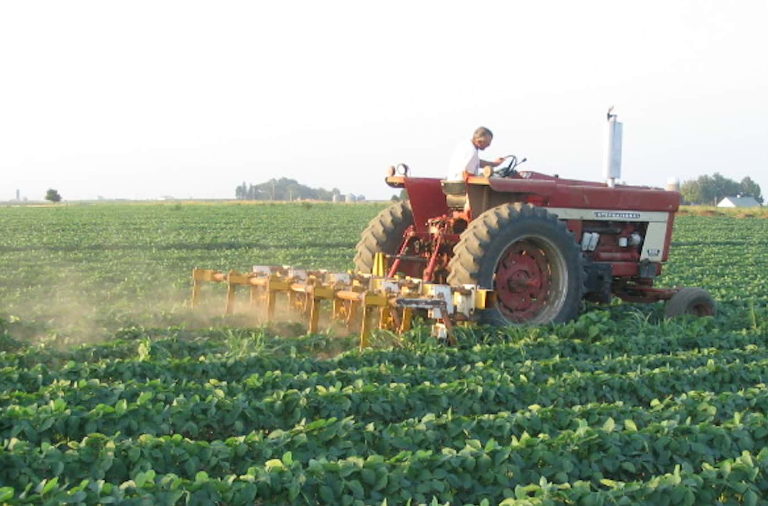For more than 30 years Rosmann Family Farms has operated a 700-acre organic farm in Harlan, Iowa. Today, Ron and Maria Vakulskas Rosmann and two sons grow organic grain, produce, and livestock. Their on-site Farm Sweet Farm store also offers organic meats, produce and popcorn.
The oldest son, David, works the farm. He and his wife and clinical psychologist, Dr. Rebecka Tompkins Rosmann, raise their family there too. Daniel Rosmann also lives here with his wife, Ellen. In addition, they run the local Milk & Honey restaurant and a food delivery service. A third son, Mark, works for the Foreign Agricultural Service of United States Department of Agriculture (USDA) and will leave in spring 2020 for the U.S. embassy in New Delhi.
The Rosmanns have hosted more than 50 farm field days plus visits with farmers, researchers, and government officials from the U.S. and six continents. And the family was named 2018 Organic Farmers of the Year at the annual MOSES Organic Farming Conference in La Crosse, Wis.

Maria comes from Sioux City, Iowa and Ron grew up on this farm. With one brother involved in civil rights efforts and another practicing clinical psychology, Ron long suspected he would be the next family farmer. When Ron’s dad’s heart began failing and he talked about renting out the farm, Ron and Maria took over.
The USDA first toured the farm in the 1980s as Maria cared for their young sons and the couple stopped using pesticides. After growing up with traditional cultivation methods and mechanical weed control, and majoring in biology, Ron questioned why farmers used so many chemicals. “A 1980 USDA report [also] addressed this,” he says. “That’s when I started to get involved with the USDA at a national level.”
Today, the farm raises 200 egg-laying chickens, 100 Red Angus cows and their calves, and 45 female hogs. Animals receive no antibiotics, growth hormones, or synthetic parasiticides. They have generous outdoor access and grazing rotation.
Organic grains include corn, oats, wheat, and barley, plus hay and hybrid rye. Soy, field peas, and turnips grow here while hairy vetch, hay, millet, and radishes also provide ground cover.
Ron served on the board of Practical Farmers of Iowa—which utilizes “farmer-led investigation and information sharing to help farmers practice an agriculture that benefits both the land and people”—for 12 years. The Rosmanns annually hosted the organization from 1987 into the 2000s, with biannual visits now.
The farm’s biannual field days are open to the public, providing opportunities for farmers to share their knowledge. In addition, visitors have come to the farm from as far away as China and South America.

The farm has also assisted The Iowa State University Extension and Outreach Agriculture and Natural Resources and other institutions with randomized replicated research trials. “It gives you real answers as to whether you can be successful in reducing [farm chemicals],” Ron said. “We have data based on published research with statistical analysis help from an Iowa State agronomist.”
Four trials compared ridge-till (which is like no-till farming) with conventional tilling of soy grown with or without herbicides. Five to seven times more weeds occurred with conventional tilling.
Another study compared cattle fed only corn to those cows that grazed and ingested only half the amount of corn. “Fatty acids and omegas were better in the pasture, half corn group,” Ron says. “Iowa State did the economics and they were better too.”
Ron speaks about creating resilient farming systems amid climate change too. He has also advised Senator Elizabeth Warren, who visited the farm in August 2019, and Senator Jeff Merkley from Oregon. “I want to preserve the integrity of organic because there is so much confusion in labels making it hard for consumers to know what they’re getting,” Ron says. “The word organic needs to mean what it says.”





